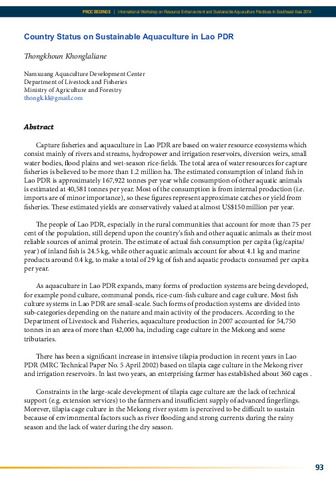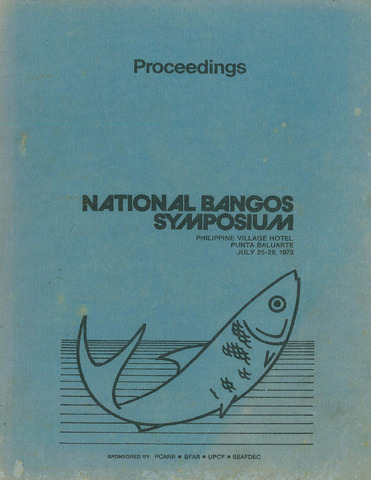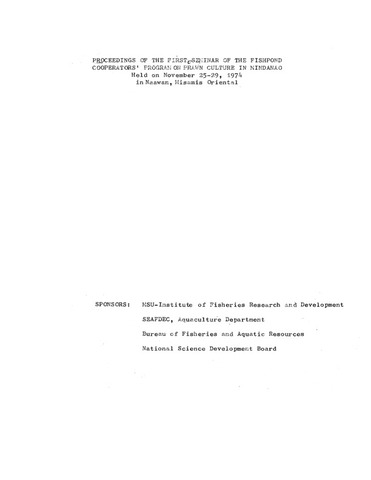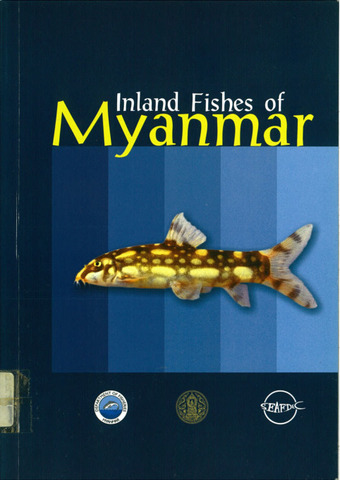Country status on sustainable aquaculture in Lao PDR
Share
Abstract
Capture fisheries and aquaculture in Lao PDR are based on water resource ecosystems which consist mainly of rivers and streams, hydropower and irrigation reservoirs, diversion weirs, small water bodies, flood plains and wet-season rice-fields. The total area of water resources for capture fisheries is believed to be more than 1.2 million ha. The estimated consumption of inland fish in Lao PDR is approximately 167,922 tonnes per year while consumption of other aquatic animals is estimated at 40,581 tonnes per year. Most of the consumption is from internal production (i.e. imports are of minor importance), so these figures represent approximate catches or yield from fisheries. These estimated yields are conservatively valued at almost US$150 million per year.
The people of Lao PDR, especially in the rural communities that account for more than 75 per cent of the population, still depend upon the country's fish and other aquatic animals as their most reliable sources of animal protein. The estimate of actual fish consumption per capita (kg/capita/ year) of inland fish is 24.5 kg, while other aquatic animals account for about 4.1 kg and marine products around 0.4 kg, to make a total of 29 kg of fish and aquatic products consumed per capita per year.
As aquaculture in Lao PDR expands, many forms of production systems are being developed, for example pond culture, communal ponds, rice-cum-fish culture and cage culture. Most fish culture systems in Lao PDR are small-scale. Such forms of production systems are divided into sub-categories depending on the nature and main activity of the producers. According to the Department of Livestock and Fisheries, aquaculture production in 2007 accounted for 54,750 tonnes in an area of more than 42,000 ha, including cage culture in the Mekong and some tributaries.
There has been a significant increase in intensive tilapia production in recent years in Lao PDR (MRC Technical Paper No. 5 April 2002) based on tilapia cage culture in the Mekong river and irrigation reservoirs. In last two years, an enterprising farmer has established about 360 cages.
Constraints in the large-scale development of tilapia cage culture are the lack of technical support (e.g. extension services) to the farmers and insufficient supply of advanced fingerlings. Morever, tilapia cage culture in the Mekong river system is perceived to be difficult to sustain because of environmental factors such as river flooding and strong currents during the rainy season and the lack of water during the dry season.
Suggested Citation
Khonglaliane, T. (2015). Country status on sustainable aquaculture in Lao PDR. In M. R. R. Romana-Eguia, F. D. Parado-Estepa, N. D. Salayo, & M. J. H. Lebata-Ramos (Eds.), Resource Enhancement and Sustainable Aquaculture Practices in Southeast Asia: Challenges in Responsible Production of Aquatic Species: Proceedings of the International Workshop on Resource Enhancement and Sustainable Aquaculture Practices in Southeast Asia 2014 (RESA) (pp. 93-94). Tigbauan, Iloilo, Philippines: Aquaculture Department, Southeast Asian Fisheries Development Center.
Subject
Related items
Showing items related by title, author, creator and subject.
-
Proceedings of the National Bangos Symposium, Philippine Village Hotel, Punta Baluarte, July 25-28 1975
Philippine Council for Agriculture and Resources Research (PCARR); Bureau of Fisheries and Aquatic Resources; University of the Philippines College of Fisheries; Southeast Asian Fisheries Development Center, Aquaculture Department (1975) -
Proceedings of the First Seminar of the Fishpond Cooperators' Program on Prawn Culture in Mindanao held on November 25-29, 1974 in Naawan, Misamis Oriental
MSU-Institute of Fisheries Research and Development; Southeast Asian Fisheries Development Center, Aquaculture Department; Bureau of Fisheries and Aquatic Resources; National Science Development Board (1974) -
Inland fishes of Myanmar
Vidthayanon, Chavalit; Termvidchakorn, Apichart; Pe, Myint (Secretariat, Southeast Asian Fisheries Development Center, 2005-12)This handbook of some inland fishes in Myanmar was based on a rapid field survey of SEAFDEC supported team and long term observation of the authors on common species and some taxa, obtained from the aquarium trade. We ...





